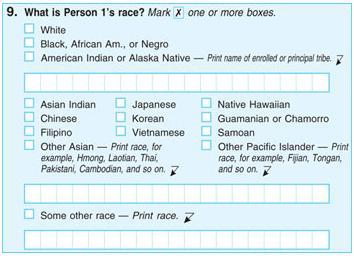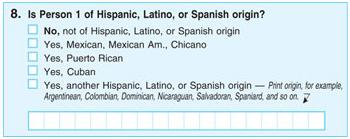Advertisement
'The Census Is Here! The Census Is Here!'
2010 census forms are due to be mailed out to every home in the country in just a few weeks. With millions of federal dollars at stake, Massachusetts officials are scrambling to make sure that historically under-counted minority and immigrant communities fill out and mail in their forms.
But aside from the issue of whether people are counted, there's also the issue of how they're counted. The new racial categories on this year's form are sparking some controversy.
Negro Or Nigerian, Just Check 'Black'

Inside the Roxbury Mall on the corner of MLK Boulevard and Warrant Street, Cheryl Crawford fills balloons as she holds court with passing shoppers.
Cheryl is from the voting rights group MassVOTE, and she’s here promoting the census in a neighborhood that was, by some estimates, under-counted by 30 to 40 percent in 2000.
"The census is here! the census is here!" she calls out.
It’s a predominantly working-class African American crowd passing by. The Boston branch of the NAACP has its headquarters right here. Its president, Karen Payne, comes out to help drive home the message. “Everyday things — our schools, our nursing homes, our senior citizen homes — all those things are impacted if we don’t get counted," she says.
"Everyday things — our schools, our nursing homes, our senior citizen homes — all those things are impacted if we don’t get counted.”
--Karen Payne, Boston NAACPBut there’s an extra wrinkle involved in getting this community counted this year. On the census form, Question 9 asks: “What is your race?” The first box is labeled: “White.” Next to the second box, it says: “Black, African Am., or Negro.”
Advertisement
Payne says African Americans have gone through many phases of how they are portrayed as a race. "My mother is 81 years old and she’s gone through all those different categorations [sic],” she says.
In those 81 years, the word “Negro” has turned up on a number of census forms. But many today hear the term as an epithet, and younger blacks are bristling at its appearance on a government form.
Karen Payne says she at least understands the reasoning behind the word's reappearance. “You know, there were 50,000 people that filled out their census in 2000," she says, "and they identified themselves as ‘African American,’ and then they wrote in ‘Negro.’ ”
Payne says how older blacks wish to describe themselves is of no concern to her. She’s encouraging everyone here to write in anything they want, from “Negro” to “Nigerian,” so long as they also check that top box that says "Black."
Not Hispanic, Not Latino, Not Spanish. Brazilian.
 Across the river in Cambridge, another minority group is having its own troubles with the racial questions on the form.
Across the river in Cambridge, another minority group is having its own troubles with the racial questions on the form.By some estimates, Brazilians now constitute the largest immigrant population in Massachusetts. But no one knows really, because the census doesn’t specifically count Brazilians.
Renan Leahy, with the Massachusetts Association of Portuguese Speakers, is trying to get around that problem today. He’s at Muqueca Brazilian Restaurant, talking up the census with the employees.
He translates as he speaks to one of the Brazilian women. “She’s saying she really doesn’t identify herself as Hispanic, Latina or Spanish, which Question 8 asks — if she is from Hispanic background, Latino or Spanish," he says. "As Brazilian, she says she’s none of that.”
The first priority for Leahy’s organization is to get people counted, period. But their second priority is to get Brazilians to answer “no” to the Latino question, and then to write-in “Brazilian” as their race. Many Brazilians feel that "Latino" is too closely identified with Spanish speakers to suit them.
“It is important that all Brazilians fill out the census form as Brazilians," Leahy says, "so we can show that we are trying to become a stronger community, and we are trying to be more united and get together and have more political power in this country as well.”
Add that to the long list of things that are at stake for Massachusetts communities as Census 2010 rolls out.
This program aired on January 29, 2010.
